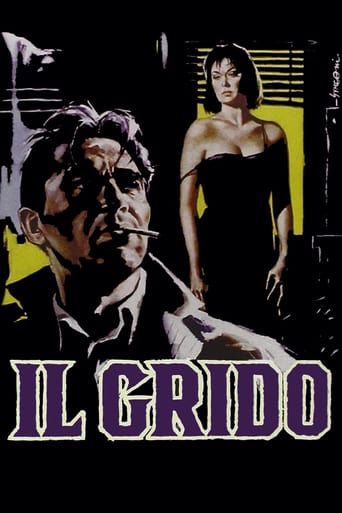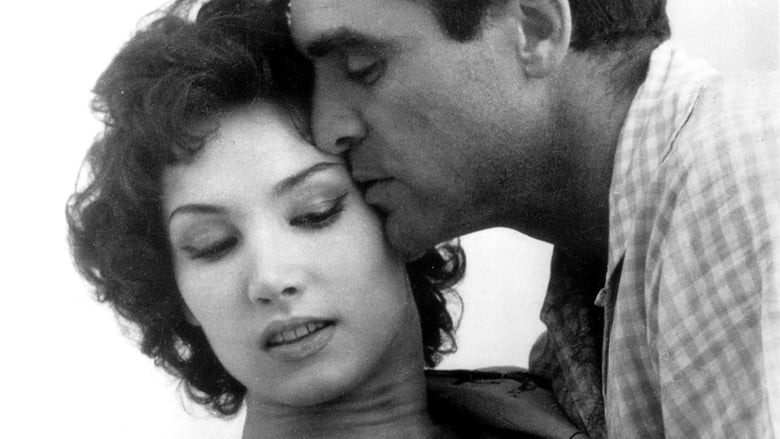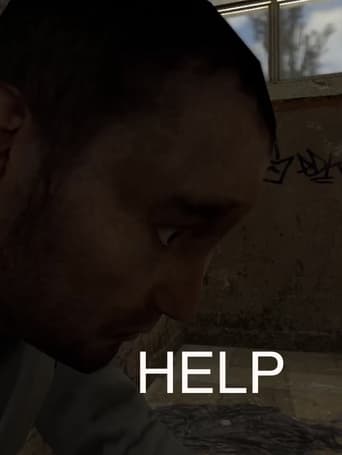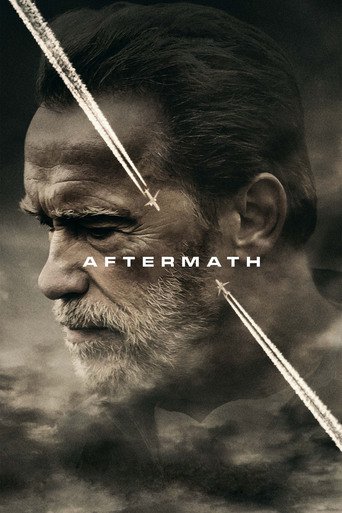

Il Grido (1962)
A sugar-refinery worker flees his Northern Italy town after a woman refuses his marriage proposal.
Watch Trailer
Cast


Similar titles
Reviews
A local theater is currently showing an Antonioni Exhibition and doing a retrospective of several of his films.Although I am familiar from film studies with this period of Italian cinema I had not yet seen any Italian Neo-Realist films, or any Antonioni films for that matter.The film starts of well with some decent drama but quickly evolves into a meandering tale. Throughout the film I often found myself on the verge of boredom, thankfully Aldo's encounters with different women kept me still somewhat entertained. The existentialist themes of this story are not lost on me but I did find this somewhat of a chore to sit through.I only really put together the films themes in my head after watching it. So it did leave me thinking but not very much.This is a film I could only recommend to someone that is actually interested in this period of Italian cinema and this particular director. A solid film but nothing spectacular. I followed it up with watching L'Eclisse for the first time a couple of days later, which I enjoyed a great deal better.
Some folks watching "Il Grido" might be surprised to see some Americans in this Italian film. In the 1950s and 60s, quite a few Italian directors (such as Antonioni and Fellini) cast Americans and had them dubbed into Italian. Most were second and third tier actors at the time (such as Steve Cochran, Richard Basehart and Anthony Quinn) but later even some big name stars performed in the Italian films (such as Burt Lancaster). I think the reason they did this was to attempt to increase the marketability of the movies outside of Italy--and these stars would help.The film begins with Irma (Alida Valli) learning that her husband is dead. He apparently has been gone for many years and the interim she's been living with Aldo (Steve Cochran). They even have a child together. Here's the odd part, however, now that she knows she's a widow, she tells Aldo to leave! He is not at all happy and eventually he disappears along with his daughter. For the rest of the film, Aldo and his daughter move from town to town. However, Aldo has difficulty connecting with other women and he rejects opportunity after opportunity for relationships. Instead, he remains socially isolated and depressed.Overall, you'll probably find this film a bit slow and depressing. While this is usually a big turn-off, it actually works here. Director Antonioni wants to create a depressing portrait of a lost man and does it quite well. The simple piano score sure helps with this. Not a film for everyone but exceptionally well made.By the way, at one point in the film, you see folks saying they caught a couple porcupines and were going to eat them. These actually were hedgehogs--you never would hold porcupines the way they did nor do I think you'd eat them! This is simply a mistranslation.
Antonioni is one of the sages of cinema, perhaps the wisest of them. His cinema is a stunning edifice; a structure rigid and harmonious as shaped by a visual vocabulary which articulates with few words a place and a time; pattern and blueprint, whereby each film as individual level informs and is informed by the whole; these levels filled with doors to insight and intuition. To all these doors he holds the keys, and in the spaces behind the doors, which are closed to most filmmakers, he moves freely and sees everything. Meditation as stillness of mind, which enables awareness.Naturally some of these levels are more aptly functional, staircases that lead higher. Il Grido is one of those (and La Notte later).Nonetheless we see here the early sketches of what is to come. We see a man cast adrift after a painful breakup as passing through various lives, affecting them with shortlived passions and vexations. Each of these lives he briefly shares could be a possible new home, a safe harbor where peace and happiness are finally possible. But he moves on, still clinging to a mad hope and frustrated desire that his old affair could resume at any point.So this is the fascinating stuff. A man alone, itinerant, ostensibly free to be what he may, but captive of his desires so that he's nothing at all, except perhaps a painful memory. The downward spiral into squalor and misery is not simply the upkeep of a bad karma, but a reminder of what fuels the restlessnesss. What negativity keeps him going, regret or unfulfillment, will only be encountered ahead of him, it cannot be escaped by running from it.In passing through these phases the film perhaps stalls for too long. We understand what is going on, the proverbial journey of an empty, unfulfilled life, but Antonioni wants to shape these lives as lived, meaning we get the mundane details of their routine. The comings and goings and side characters, as vignettes. This is the neorealist baggage ostensibly cinema in the service of revealing/documenting society, which Antonioni is about to shed for his next film, and be free as a creative spirit.For the end Antonioni reserves defeaning symbolism, by contrast to the hazy allusions he would favour onwards. The man climbs on the refinery tower, the place and time where he was for once happy in his life and which now seems impossible to attain again, and we don't even have to guess what happens next.
Other reviews to the contrary, if you found Le Notte or L'Eclisse lacked sufficient plot, I doubt you'll enjoy Il Grido. However, unlike later Antonioni, the focus here is not on fear of commitment & loss of passion, but on a classic spurned lover. Like L'Eclisse, Il Grido begins with breakup, magnificently acted & powerfully filmed; we feel each shudder of pain. In fact, both films' power rests on us sharing this experience, second by second, nerve-end by nerve-end. Note Irma's efforts to hold to the fabric of order & routine to keep a lid on Aldo's fury & the careful portrayal of Aldo's frustrations. Il Grido's opening builds to a very public & final breakup. It initiates Aldo's journey away from Irma & home. I kept thinking of Schubert's song cycle, Winterreise. In both, after rejection the protagonist's world ceases to hold together. Only here the descent isn't into winter but into fog, industrial sprawl, & ever more spartan existence. Even the piano which accompanies Aldo reminded me of lieder. The opening's not quite picturesque scenery may suggest nurturing home values. Unlike couples in other Antonioni classics, Aldo & Irma have a daughter, & to Aldo their lives seemed fulfilled. The almost picturesque is soon replaced by encroaching industrial sounds & images. Several times we see trees felled as an old order is being swept away. At film's end, the whole town is slated for demolition, & we are asked to contemplate the relation between the Winterreise-like main text of lost love & this subtext of industrial sprawl & oppressive, intrusive government. No clear connection is given, but as in later Antonioni, the images work their effect as much on our subconscious as on our intellect; whether we can verbalize our thoughts or not, we feel this rupture with earlier values & social structures. For me, Il Grido is a more honest film than L'Avventura. If it lacks a bit of the elegant, refined photo compositions of Antonioni's trilogy, it rests on the same detailed, carefully structured cinematography.














